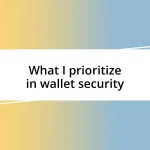Key takeaways:
- Crypto insurance serves as a crucial safety net for investors, mitigating risks related to hacks, fraud, and operational errors in a volatile market.
- Understanding the different types of crypto insurance, including custodial, self-custody, and business operational policies, is essential for effective investment strategies.
- Effective communication and diligent documentation are key when navigating the often complex claims process in crypto insurance, ensuring smoother resolutions during critical times.

Understanding Crypto Insurance Basics
When I first stumbled upon the concept of crypto insurance, I was intrigued yet perplexed. After all, how can you insure something that, by its nature, is decentralized and often volatile? This paradox plays a significant role in understanding crypto insurance, which aims to protect investors against risks like hacks or fraud, essentially trying to bridge that gap between traditional insurance and the cryptographic world.
Initially, I thought that crypto insurance was simply a safety net—like a reassuring blanket you could pull over your investments. But as I dove deeper, I realized it encompasses various coverage types, including custodial insurance for exchanges and policies for individual holdings. Have you ever considered how a breach at your favorite exchange might impact your peace of mind? That’s where these policies come into play, granting some form of security amid the uncertainty.
In my experience navigating the crypto landscape, it became clear that not all insurance policies are created equal. Some provide coverage for losses due to hacking, while others might cover operational errors. This varied scope of coverage often leads to difficult decisions for investors. Are you prepared to really understand what you’re signing up for? Taking the time to evaluate your needs and the specifics of a policy can make all the difference in protecting your digital assets.

Why Crypto Insurance Matters
Navigating the world of crypto can feel like walking a tightrope—exhilarating yet fraught with danger. What I’ve learned is that crypto insurance serves as a vital safety net, protecting against the unpredictable. Imagine investing hard-earned money into a digital asset only to wake up one day and find it missing due to a hack. The thought sends shivers down my spine, especially considering how easy it is to fall prey to cyber threats. That’s where the significance of crypto insurance becomes crystal clear; it provides reassurance in a landscape where volatility reigns supreme.
- Crypto insurance mitigates risk, addressing losses from events like hacks, fraud, or operational errors.
- It allows investors to maintain peace of mind, knowing there’s a safety net in place.
- Many traditional insurers are beginning to enter the crypto space, indicating growing legitimacy in this coverage area.
- Comprehensive policies can adapt to the evolving challenges in the crypto world, reflecting the nature of digital assets.
The more I investigate, the more I understand that having this kind of coverage is not just a luxury but a necessity. In a market where fortune can swing on a dime, being adequately insured can protect your investments and your mental well-being. Have you thought about what it might feel like to lose everything overnight?

Types of Crypto Insurance Policies
When it comes to crypto insurance, understanding the various types available can significantly impact your investment strategy. One prominent type is custodial insurance, which covers funds held on exchanges. I recall an incident where a friend lost a substantial amount of money during a hack on a popular exchange. It was a wake-up call for him to think seriously about this type of coverage. Without custodial insurance, he would have had no recourse to recover his losses.
Another common policy is self-custody insurance, designed for individuals who manage their private keys. I’ve always been a bit wary of managing my own keys, but having insurance for my digital wallet makes me feel more secure. It’s kind of like having a life jacket while you’re learning to swim—assuring but not a substitute for being cautious. Without self-custody insurance, if you misplace your keys, you’re out of luck, and it’s a lesson I learned quickly.
Lastly, policies for businesses, which cover operational risks, have gained traction. I once attended a webinar where insurance experts discussed the increasing demand for these policies, reflecting the evolving nature of the crypto landscape. I found it fascinating how businesses now seek protection from systemic risks, including smart contract failures or hardware malfunctions. This tackling of operational risks is crucial as the crypto industry matures, letting businesses innovate confidently.
| Type of Crypto Insurance | Description |
|---|---|
| Custodial Insurance | Covers funds held on exchanges against theft or hacks. |
| Self-Custody Insurance | Protects individuals managing their private keys from loss. |
| Business Operational Insurance | Addresses risks tied to business operations and system failures. |

Key Players in Crypto Insurance
The landscape of crypto insurance is rapidly evolving, and several key players are steering this transformation. For instance, companies like Nexus Mutual and Etherisc are pioneering decentralized insurance solutions. I recall signing up with Nexus Mutual and feeling empowered, knowing that my coverage relied on a community rather than a traditional corporation. This innovative approach truly resonates with the essence of crypto—decentralization.
Traditional insurance firms are also recognizing the potential in the crypto space. It’s interesting to see industry giants like Lloyd’s of London and Allianz gradually entering this arena, bringing much-needed credibility. When I first learned about this development, I felt a surge of optimism. Could this signal that crypto is finally being accepted in mainstream finance? It certainly feels promising.
Furthermore, startups like Cover and InsurAce are stepping in with tailored policies specifically designed for crypto assets. I remember reading about how they structure their products based on community feedback, which made me think about the importance of adaptability in today’s market. Isn’t it fascinating how these players are driven by user needs and market dynamics? This responsiveness ensures that as the crypto world changes, the insurance offerings evolve alongside it, providing better protection for all of us involved.

Navigating Claims in Crypto Insurance
When it comes to navigating claims in crypto insurance, the process can feel daunting, especially if you’re new to the landscape. I remember grappling with the claims process after an unfortunate incident involving a hack. It was overwhelming; the terminology felt foreign, and I was bombarded with forms and requirements that seemed almost endless. I wondered, how does one even begin to provide the necessary documentation when the world of crypto is so fluid?
There’s something challenging yet empowering about this journey. Experiencing the claims process firsthand, I realized the importance of meticulously documenting every transaction and keeping records updated. It might seem tedious at first, but I assure you, being organized can save you a significant amount of stress down the line. I once overlooked a crucial piece of information that nearly derailed my claim, and trusting that everything would just work out—well, it just didn’t.
An often overlooked aspect is communication with your insurance provider. I recall feeling anxious waiting for responses, wishing for clearer timelines. Good communication can be a game-changer. When I started actively engaging with my provider during the claims process, I found the experience much smoother. It made me contemplate—how often do we underestimate the power of reaching out for clarification and support? In the realm of crypto insurance, proactive communication is vital for ensuring that you’re in good hands when it truly matters.












